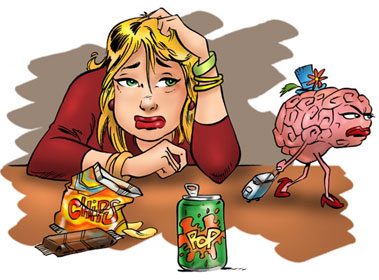Comfort eaters may consume less in good times
When faced with stress, does the very thought of food turn your stomach, or do you instantly reach for a burger and fries or a bar of chocolate? People who seek solace in food during times of stress are usually the ones told to regulate their bad habits, but new research from Germany finds that, in good times, stress eaters eat much less.
The research, published in Psychological Science, shows that both people who overindulge and those who shun food in times of stress compensate for their behavior in positive situations. Stress eaters eat less following a positive experience, while stress shunners eat more.
Overeating or eating unhealthy food when faced with stress is something 43% of Americans admit, according the study, while 36% confess to skipping at least one meal in the last month due to stress.
Questioning current wisdom
The study argues that stress eaters, or stress hyperphagics, are widely viewed as having “maladaptive self-regulation that contributes to weight gain and the current obesity epidemic.” This negative attitude may, in itself, add to their stress levels, creating a never-ending cycle.
Stress hypophagics, or people who skip meals when stressed, may be seen as “lucky,” and many health professionals and researchers assume that they do not need to change their behavior.
But the current research questions this belief. As lead researcher Gudrun Sproesser, from the University of Konstanz, explains:
“These findings challenge the simplistic view that stress eaters need to regulate their eating behavior to prevent weight gain. Both skippers and munchers have their ‘soft spot’ for food, they just show different compensatory eating patterns in response to positive and negative situations.”
Stress after birth linked to comfort food preferences in adulthood
Researchers have found that rats exposed to heightened levels of stress during their first few days of life are more likely to be prone to anxiety and stress in later life, and prefer to consume sugary and high-fat foods.
The study was presented at the Annual Meeting of the Society for the Study of Ingestive Behavior (SSIB).
Adult rats that experienced stressful neonatal environments are more likely to feel stressed and seek “comfort” foods throughout adulthood.
“Comfort foods” are consumed in response to stress or anxiety, they are believed to play a huge role in the ever-growing obesity pandemic.
A study published in the Journal of Marketing, by Brian Wansink, revealed that people feeling sad tend to eat more of less-healthy comfort foods than when they feel happy.
 Sproesser and colleagues recruited participants for the study using subterfuge - they claimed they were researching “first impressions.” The 251 volunteers were invited to interact with an unfamiliar partner by video before meeting them in person.
Sproesser and colleagues recruited participants for the study using subterfuge - they claimed they were researching “first impressions.” The 251 volunteers were invited to interact with an unfamiliar partner by video before meeting them in person.
All the participants made videos and were given one of three replies from the “partner.”
They were told:
The partner had decided not to meet them after seeing the video
The partner liked them and was looking forward to meeting them
The experiment had been cancelled.
All the participants were then invited to take part in another, supposedly unrelated, study - taste testing ice cream flavors - and there were no restrictions on the amount they could eat.
Rejection and ice cream
 The researchers found that, when they were faced with negative feedback, the self-identified “munchers” ate more ice cream than the control group - those who were told the experiment was cancelled.
The researchers found that, when they were faced with negative feedback, the self-identified “munchers” ate more ice cream than the control group - those who were told the experiment was cancelled.
Those who shunned food, or “skippers,” ate less. On average, the munchers ate 180 calories more of the ice cream - equivalent to about half a cup.
When faced with positive feedback, stress eaters ate less than the control group, while the skippers ate more - on average, skippers ate 74 calories more than the munchers in this situation.
Sproesser admits the results were unexpected:
“We predicted that munchers and skippers differ in food intake after experiencing a positive situation. However, we were rather surprised that the data showed an almost mirror image in ice cream consumption when compared to the data from the social exclusion condition.”
The researchers claim that the study offers a new view on the relationship between stress and eating, and gives health care professionals food for thought when promoting healthy eating.
“Stress eaters should not be considered at risk to gain weight by default,” says Sproesser. “Our results suggest the need for a dynamic view of food intake across multiple situations, positive and negative.”
The report states that 48% of Americans believe their stress has increased over the past 5 years, and one-third claim they are living with extreme stress. Vilifying those who comfort eat may do more harm than good, as it may prevent them self-regulating in good times.
Sproesser explains:
“Furthermore, our findings suggest rethinking the recommendation to regulate stress eating. Skipping food when being stressed may cause additional stress in munchers and could possibly disturb compensation across situations.”
Medical News Today reported in August that early exposure to stress could influence later “comfort eating” habits.
###
Written by Belinda Weber